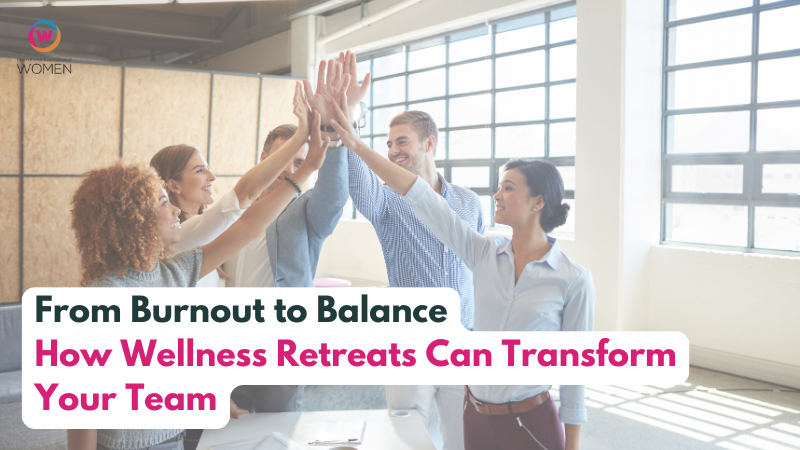Burnout has become the quiet epidemic of the modern workplace.
We see it in disengaged meetings, rising stress levels, and talented professionals who feel drained long before the end of the week. Yet, more organizations are realizing that productivity isn’t fueled by constant pressure—it’s sustained by balance, clarity, and well-being.
That’s where wellness retreats come in. Far from being a “perk,” they’re emerging as a strategic investment in people, culture, and performance.
To explore how retreats can re-energize teams and help women leaders create sustainable success, we turned to Kellie Sabas, founder of Happy ME LLC . With years of experience planning transformative retreats and wellness experiences, Kellie helps organizations move from burnout to balance—one mindful experience at a time.
“A well-designed retreat isn’t an escape from work,” says Kellie. “It’s a reset for how we show up to it.”
1. Recognize That Burnout Isn’t Just an Individual Problem
Burnout is often treated as a personal failure—something employees should “fix” on their own through better time management or self-care. But according to Kellie, burnout is a systemic issue that stems from a lack of balance in how teams function.
“People don’t burn out because they’re weak,” she explains. “They burn out because they’ve been running on empty in systems that don’t prioritize recovery.”
Wellness retreats give employees permission to pause—to reconnect, reset expectations, and remember why their work matters. The shift in environment allows people to step away from daily demands and rebuild perspective.
2. Build Connection Before Strategy
One of the most powerful outcomes of a team retreat is the human connection it fosters.
In today’s hybrid and high-speed work culture, genuine relationships often take a backseat to deadlines and deliverables. But connection is the foundation of collaboration, creativity, and trust—all of which fuel long-term performance.
Kellie recommends beginning every retreat with intentional, heart-centered activities that help people feel grounded and seen.
“Before you dive into business planning, help your team connect on a human level,” she says. “Movement, breathwork, and mindfulness create the energy and safety that allow real collaboration to happen.”
Simple practices—like group meditation, yoga, or guided reflections—can transform the tone of the entire event.
3. Focus on Experiences That Recharge, Not Just Entertain
A great retreat isn’t about fancy venues or packed agendas—it’s about designing experiences that help participants recharge mentally, emotionally, and physically.
“Too often, retreats are so scheduled that people leave more tired than when they arrived,” Kellie notes with a smile. “The goal is restoration, not exhaustion.”
When planning a wellness retreat, consider:
- Time for movement and mindfulness between sessions
- Healthy meals that energize rather than deplete
- Quiet breaks or reflection zones to encourage personal insight
- Activities that tap into creative expression, not just corporate goals
When participants feel renewed, the energy they bring back to their teams can have a lasting impact for months.
4. Translate the Retreat Experience Into Daily Practice
The real transformation of a wellness retreat happens after it ends.
“The most meaningful retreats don’t just inspire people for a weekend—they give them tools to sustain balance every day,” Kellie explains.
Follow-up activities like morning mindfulness routines, movement breaks during meetings, or journaling prompts can help teams carry retreat lessons into the workplace. Leaders can model the shift by normalizing balance, encouraging open conversations about well-being, and scheduling check-ins that focus on people—not just projects.
5. Prioritize Wellness as a Leadership Value
Wellness isn’t a trend—it’s a leadership strategy. When organizations invest in their people’s well-being, they create cultures that attract and retain top talent.
As Kellie reminds us:
“When leaders prioritize wellness, it signals that people matter—not just productivity. That’s where real loyalty and innovation grow.”
By integrating wellness retreats into your annual strategy, you’re not just preventing burnout—you’re cultivating resilience, engagement, and trust.
Wellness retreats aren’t about stepping away from the work—they’re about returning to it renewed, aligned, and inspired.
They remind teams that success isn’t built on endless hustle, but on the ability to lead from a place of wholeness.
And for organizations looking to create meaningful change, that balance is the ultimate competitive advantage.
✨ About Kellie Sabas
Kellie Sabas is the founder of Happy ME LLC , where she helps women and organizations design wellness experiences that inspire rest, reflection, and reconnection. From yoga sessions to full-scale retreats, Kellie’s approach blends movement, mindfulness, and community to create transformation that lasts long after the event ends.
If your team is ready to move from burnout to balance, connect with Kellie Sabas to plan a customized wellness retreat that restores energy and strengthens culture.
Join Kellie for year two of the Wellness@Work Summit taking place on World Happiness Day, March 20, 2026 at Kiln in Rancho Bernardo, CA
The Wellness @ Work Summit is an immersive one-day experience for leaders who believe that a thriving culture starts with thriving people. Details available here: https://happyme.yoga/event/wellnesswork-summit-2026/




